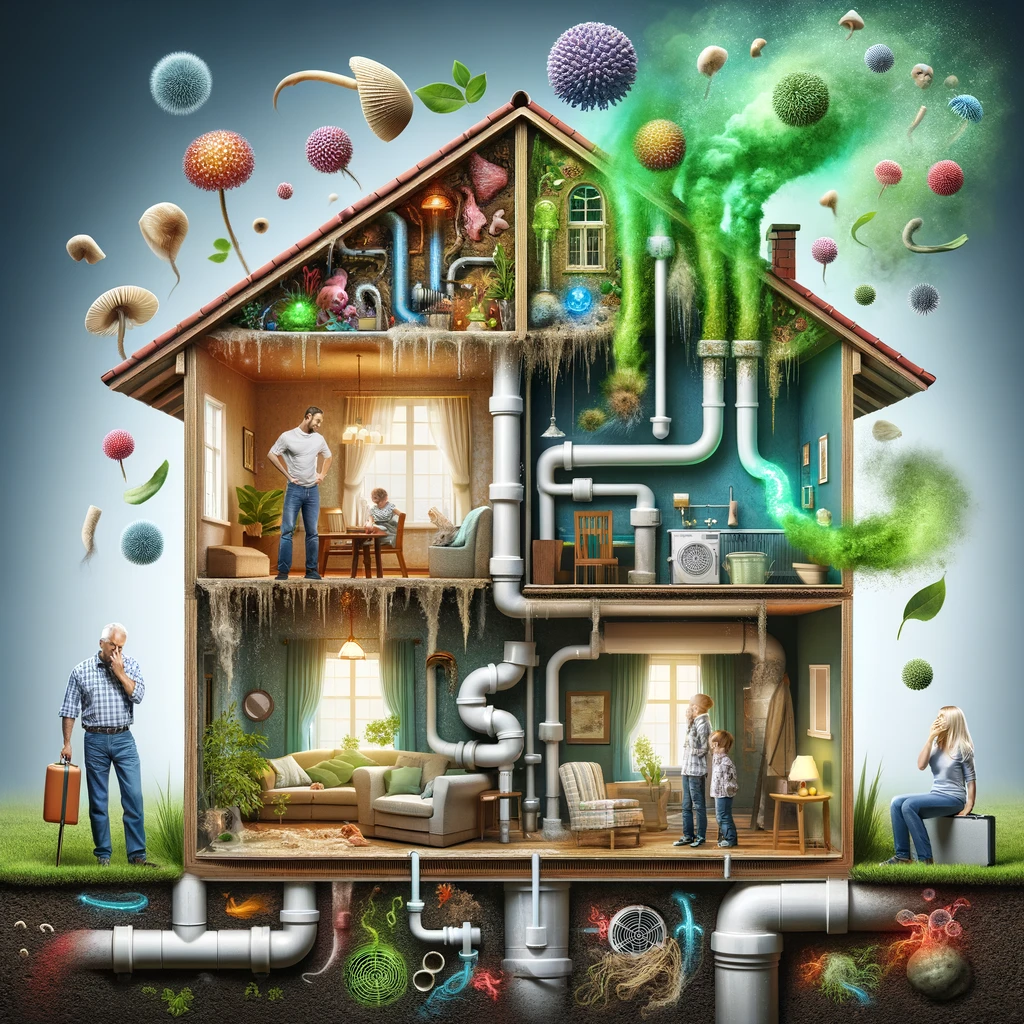Indoor Air Quality: The Direct Impact of Plumbing

Typically, when we consider factors affecting indoor air quality, we think of dust, pollen, or pet dander. However, an often overlooked but significant factor is our plumbing system. At JMK Plumbing, we recognize the crucial role plumbing plays in ensuring a healthy living environment. This blog post will explore how your plumbing directly influences the air quality inside your home, emphasizing the importance of keeping your plumbing in prime condition for your indoor air.
Key Takeaways
- Plumbing Affects Air Quality: Issues like leaks and sewer gas leaks can worsen indoor air, impacting health.
- Health Risks: Poor air quality from plumbing problems can cause immediate irritation and long-term health issues.
- Prevention is Key: Regular inspections, fixing leaks quickly, and avoiding chemical cleaners help maintain good air quality.
- Active Role Required: Both homeowners and professionals need to be vigilant in maintaining plumbing to ensure healthy indoor air.
- Overall Importance: Proper plumbing care is crucial for a safe and healthy home environment.
Unveiling the Hidden Dangers in Pipes
More than just a network of pipes and drains, your home’s plumbing system is essential for managing water flow in and out. But when it fails, it can pollute your indoor air. Here’s the breakdown:
- Leaks and Moisture: Faulty pipes leaking water can create excessive moisture, ideal for mold and mildew growth. These fungi release spores that degrade indoor air quality and pose health risks, especially for allergy sufferers or those with respiratory issues.
- Sewer Gases: Properly designed plumbing systems block sewer gases from entering your home. However, cracks, loose fittings, or dry P-traps can allow these harmful gases to infiltrate your living space. Not only do sewer gases smell bad, but they also carry dangerous substances like methane and hydrogen sulfide.
- Chemical Contaminants: Plumbing materials breaking down can release chemicals into your water, which may evaporate into the air during showering or boiling water. Homes with old lead pipes or PVC pipes face risks of air contamination with lead or volatile organic compounds (VOCs).
Understanding the Health Implications
Indoor air quality directly influences your health. Poor air can cause immediate symptoms such as headaches, dizziness, and eye, nose, and throat irritation. Long-term exposure to air contaminants like mold spores and chemicals can lead to severe health issues, including respiratory diseases and cancer. Vulnerable groups such as children, the elderly, and those with pre-existing conditions are particularly at risk.
Ensuring Clean Air Through Plumbing Maintenance
Maintaining your plumbing does more than prevent leaks or clogs; it’s crucial for protecting indoor air quality. Here are steps to ensure your plumbing doesn’t compromise the air you breathe:
- Regular Inspections: Have a professional service like JMK Plumbing inspect your system annually. We can spot and fix issues like leaks or improperly vented pipes before they impact your air quality.
- Ensure Proper Ventilation: Keep moisture-prone areas like bathrooms and kitchens well-ventilated. Exhaust fans can reduce humidity and prevent mold.
- Prompt Leak Repairs: Address leaks quickly to avoid moisture buildup and mold.
- Avoid Chemical Cleaners: These can emit harmful VOCs. Opt for mechanical clearing methods or eco-friendly cleaners instead.
- Upgrade Old Systems: Consider updating your plumbing if you have an older home. Newer, safer pipes reduce chemical contamination risks and improve water quality.
Breathing Easy at Home
The air quality in your home is crucial. By understanding and acting on the connection between plumbing and indoor air quality, you can take proactive steps to ensure a safe, healthy living space. JMK Plumbing is here to help, offering expertise and services to tackle plumbing-related air quality issues and maintain a healthy indoor environment.
Taking care of your plumbing means taking care of your air. By being vigilant and proactive, you ensure your home remains a safe, comfortable haven.
Conclusion
The relationship between your plumbing system and the quality of your indoor air is more significant than you might initially think. By understanding how plumbing issues can contribute to poor air quality and taking proactive steps to address these problems, you can protect your health and ensure your home remains a safe and comfortable environment. Regular maintenance, prompt repairs, and a keen awareness of your plumbing’s condition are essential practices for any homeowner. Remember, investing in the health of your plumbing system is an investment in the overall well-being of your home and its occupants. At JMK Plumbing, we’re committed to helping you maintain both, ensuring your living space is not just functional, but truly healthy.